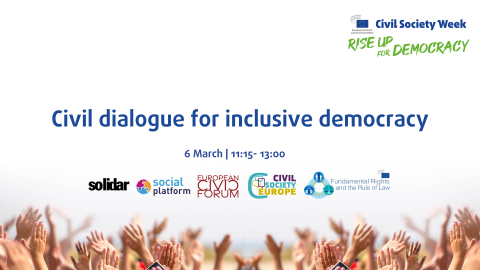European Economic
and Social Committee
Civil dialogue for inclusive democracy
Webstreaming 06/62 . Back to Agenda
Draft Agenda
11.15 – 11.20: Welcome and Introduction of the speakers - Mikael Leyi, Secretary General SOLIDAR
11.20 – 11-25: Opening remarks - Alexandrina Najmowicz, Secretary General, European Civic Forum and Board member, Civil Society Europe.
11.25 – 11.40: Presentation of the case study from South Africa - Colette Solomon, Women on Farms Project (online)
11.40 – 12.40: Panel discussion Civil Dialogue: strengthening Democracy
Moderated by Mikael Leyi, Secretary General, SOLIDAR
- Pietro Barbieri, Vice-President of EESC Civil Society Organisations’ Group, rapporteur of the opinion “Strengthening civil dialogue and participatory democracy in the EU: a path forward”
- Lucie Studnicna, President of EESC Workers’ Group.
- Laura de Bonfils, Board member of Civil Society Europe and Secretary General of Social Platform
- Ingrid Bellander Todino, Head of Unit Fundamental rights policy, DG JUST
- Vincent Vandersmissen, Attache at the Belgian Ministry of Foreign Affairs, the Directorate-General European Affairs and Coordination
Q&A with the audience
12:40 – 12:55: Presentation of the case study from Slovenia - Tina DIVJAK, CNVOS - (Online)
12:55 – 13:00: Closing remarks - Gabriella Civico, President, Civil Society Europe
Concept Note
This workshop, organised in the framework of EESC Civil Society Week 2024, aims to explore the role that civil dialogue should play – if institutionalised at European and national level - in fostering democracy through the participation of various groups including the most marginalised - such as people with a low socio-economic status, migrants, racial and ethnic minorities, persons with disabilities, vulnerable workers, youth, etc. This would ensure better consultation and participation, contributing to building European policies that deliver on people’s needs, further social justice and provide access to socio-economic and fundamental rights for all, while strengthening gender equality and inclusion. Civil society organisations already contribute to EU policy-making with the evidence originating from their direct work with their constituencies, often constituted by people in a vulnerable situation, but their impact is limited by a lack of structures and consultation mechanisms that would lead to a meaningful and permanent dialogue with EU institutions in all policy areas.
In the discussions, we will investigate the potential of civil dialogue and contribution of society organisations for the health of democracy and explore possible avenues for the creation of a structured civil dialogue. In fact, while calling for the proper implementation of Article 11 TEU, the introduction of an interinstitutional agreement on civil dialogue will be explored, as a tool to ensure recognition and implementation of civil dialogue by all EU and national institutions. Two national-level case studies of successful dialogue between CSOs and national institutions, from South Africa and Slovenia, will also be presented to inspire the debate around ways of building civil dialogue at EU level.
To this end, we will invite representatives from civil society and EU institutions to contribute to the discussions with their perspectives. The outcome of this exchange will be a set of recommendations that will inform the EESC electoral manifesto.
Questions for discussion:
-
How do CSOs contribute to high-quality and inclusive policy-making?
-
What are the main features that a structured and meaningful civil dialogue should have?
-
What are the concrete measures that should be implemented to achieve this goal?
-
What are the challenges that building an institutionalised civil dialogue will bring?
